When the #WinePW group announced the theme of this month, South Africa, the first word that popped in our minds was not a region or grape variety, but “upgrading.” That’s one of the big words we ran into at the beginning of our wine research a few years ago. Why? Because our first instinct was to go to… our university libraries’ databases. Oh, college professors. We can’t be saved. Anyway, this month’s #WinePW theme is a good reminder that we are terribly ignorant about South African wine, and South Africa more generally, and don’t drink enough South African wine!
Turns out our research was not (only) about eating and drinking
Back in 2013, to wrap our heads around how to approach China’s wine industry, an unlikely newcomer on the global wine stage, we need to learn how scholars of economic development (our field) talked about wine. The most informative studies turned out to be about countries that had previously emerged as credible wine regions, and South Africa was one of them. Over time, with hard work, the South African wine industry “upgraded,” we learned, especially after the end of apartheid when the country’s wines could finally seek a place on the world stage. Industrial upgrading is a big conversation in economic development, and usually not about wine.
By reading serious academic journal articles about South African wine, we could reassure our employers (and ourselves) that pursuing wine as a subject was not a departure from our usual research and teaching fields. Green light!
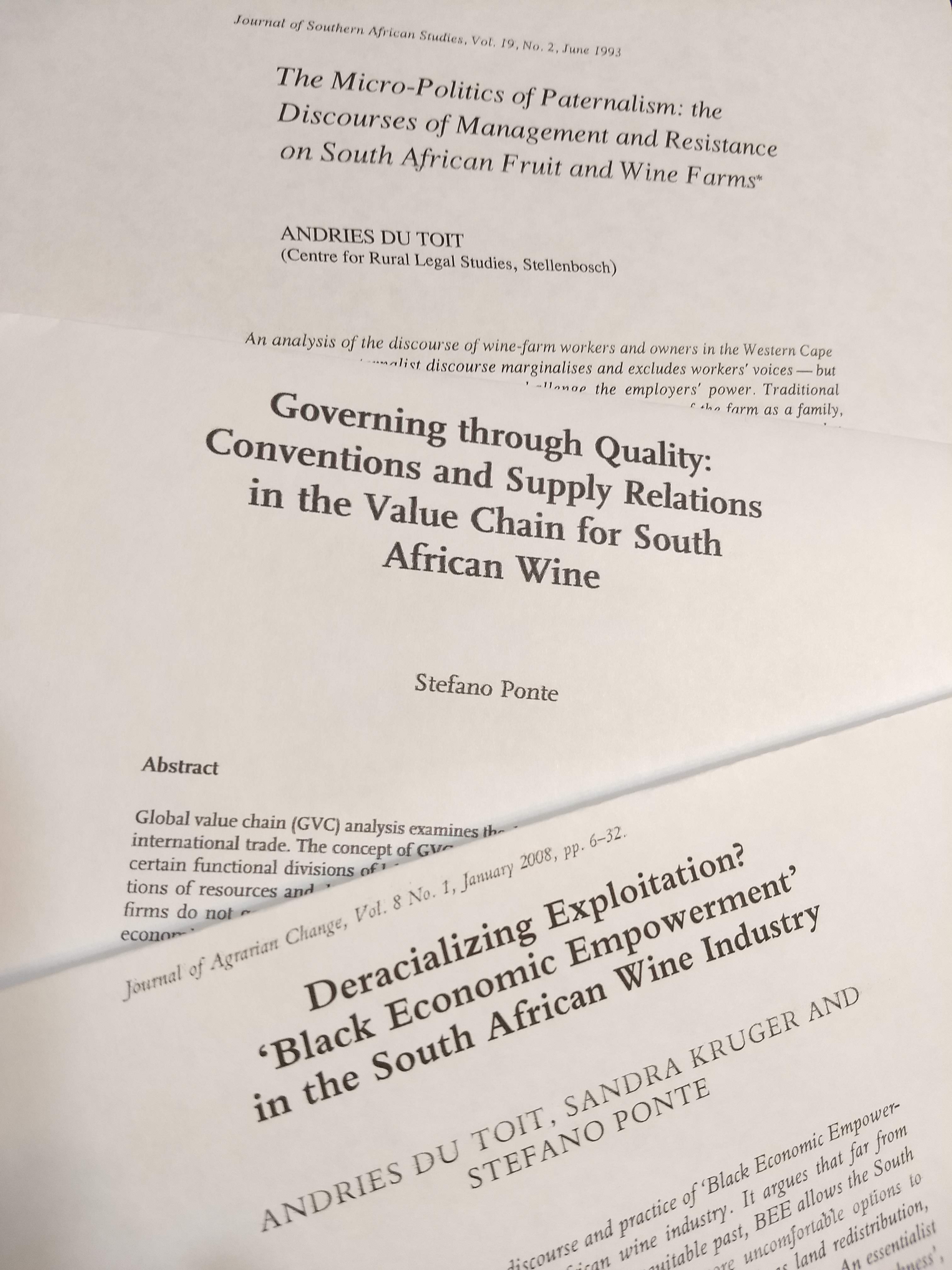
Here are a few of the works on South Africa that inspired us back then. Andries Du Toit, a rural development expert, used wine for his 1993 study of power relations between farmworkers and winery owners in the Western Cape. Political economist Stefano Ponte’s also focused on Soth African wine to study much bigger questions like, who holds power and influence at different levels of a product’s global value chain. For example, do you ever think about the impact big supermarket chains’ demands have on wine producers around the world?
Du Toit and Ponte came together in 2008 with co-author Sandra Kruger to examine the South African wine industry’s record in Black Economic Empowerment (BEE, a very big subject in South Africa). They expressed very critical views, arguing that BEE had allowed (primarily white) major wine industry players to avoid more uncomfortable and disruptive change by hiding behind a veil of good intensions. To this day, in a country whose population is 90% black and “coloured” (the local term for mixed race folks), there are still far too few black-owned wineries (there are some heartwarming success stories though!).
And if you ever read about well-intentioned and important efforts to curb alcohol abuse among the rural poor, never forget that this problem is a legacy of the old tot (or dop) system that allowed owners to pay their farmworkers with alcohol as a “benefit.” The practice, while outlawed in the 1960s, remained on many farms for decades after.
Well, we didn’t want to ruin the mood for today’s #WinePW, but doesn’t all this sound very important? We love wine because it is such a great lens to see many of the world’s most pressing issues from global trade disputes and climate change to rural poverty and the politics of race. It sounds like a great reason to explore South African wines and cheer for more progress.
The wines and the food
Wine #1: Lubanzi Chenin Blanc 2017
We bought the Lubanzi Chenin Blanc 2017 at our trusty Tacoma wine shop, Wildside Wine. This one connects more dots with other parts of our career. Pierre’s PhD dissertation was about NGOs that make money through business activities. In fact, he went to Bangladesh (where we met 15 years ago!) to study this phenomenon. There, you could literally live entirely by buying the services offered by NGO-owned businesses, from designer clothes and tea to nice hotels ans restaurants, and even sending your kids to an NGO-owned private university.
Lubanzi Wines, a project of two young Americans who studied abroad in South Africa in 2014 and came back in 2016 to start a socially conscious wine brand. They partnered with an NGO, the Pebbles Project, that works with farming families in the Winelands of the Western Cape. The back label suggests that 50% of profits go to the NGO. Wine, economic development, rural labor (Cynthia’s passion), and NGOs connected to businesses? Our career shift is starting to make even more sense. And from now on Pierre will get to talk about wine in his course on NGOs and social enterprise.
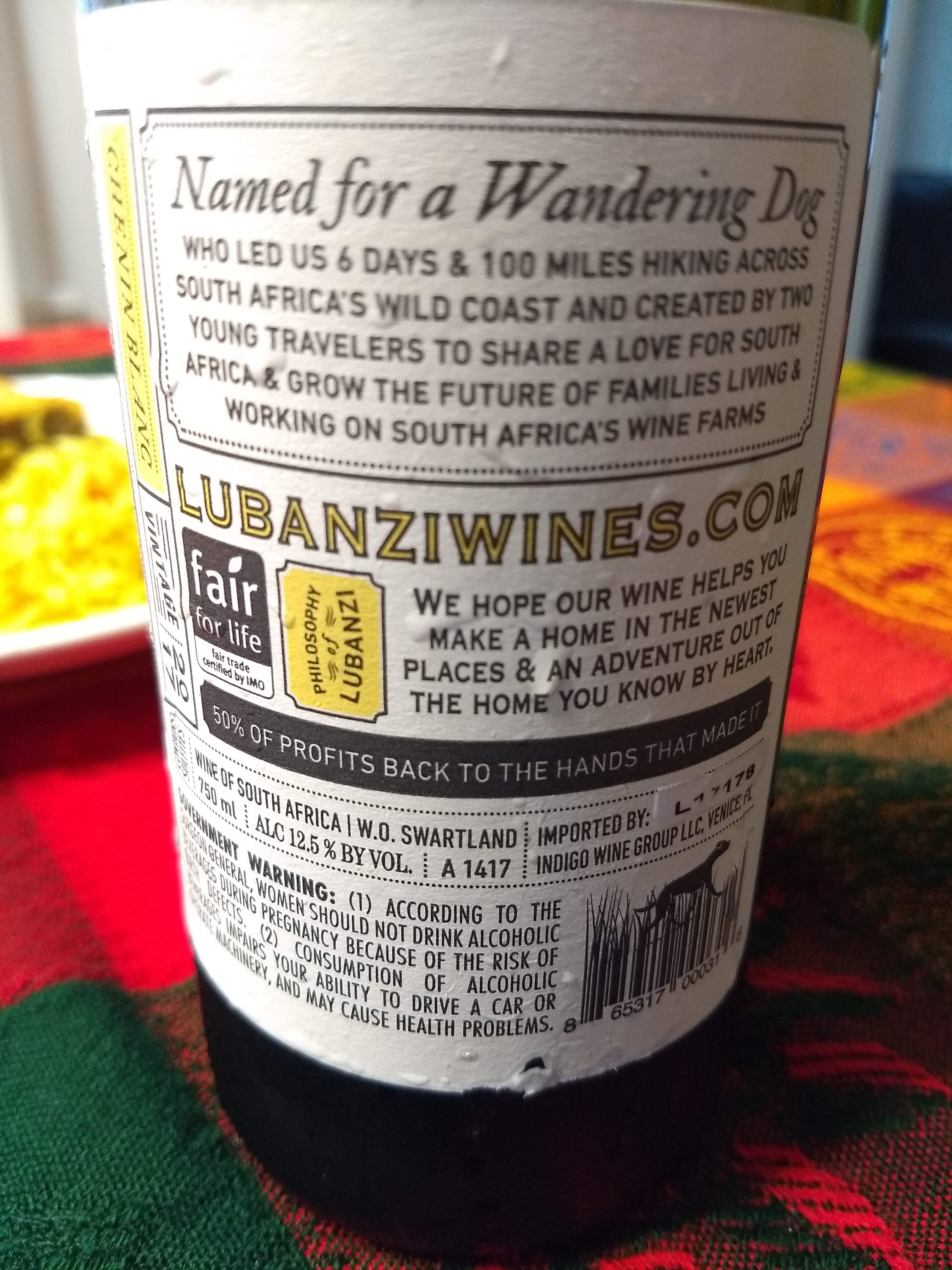
This crisp Chenin with notes of peach and pineapple went great with our first food pick. Remember we are terribly ignorant about South Africa, and the food is no exception. So we outsourced to a trusted local expert: the South African Food Affair, a food truck that comes every week to the Puyallup and Tacoma farmers’ markets.
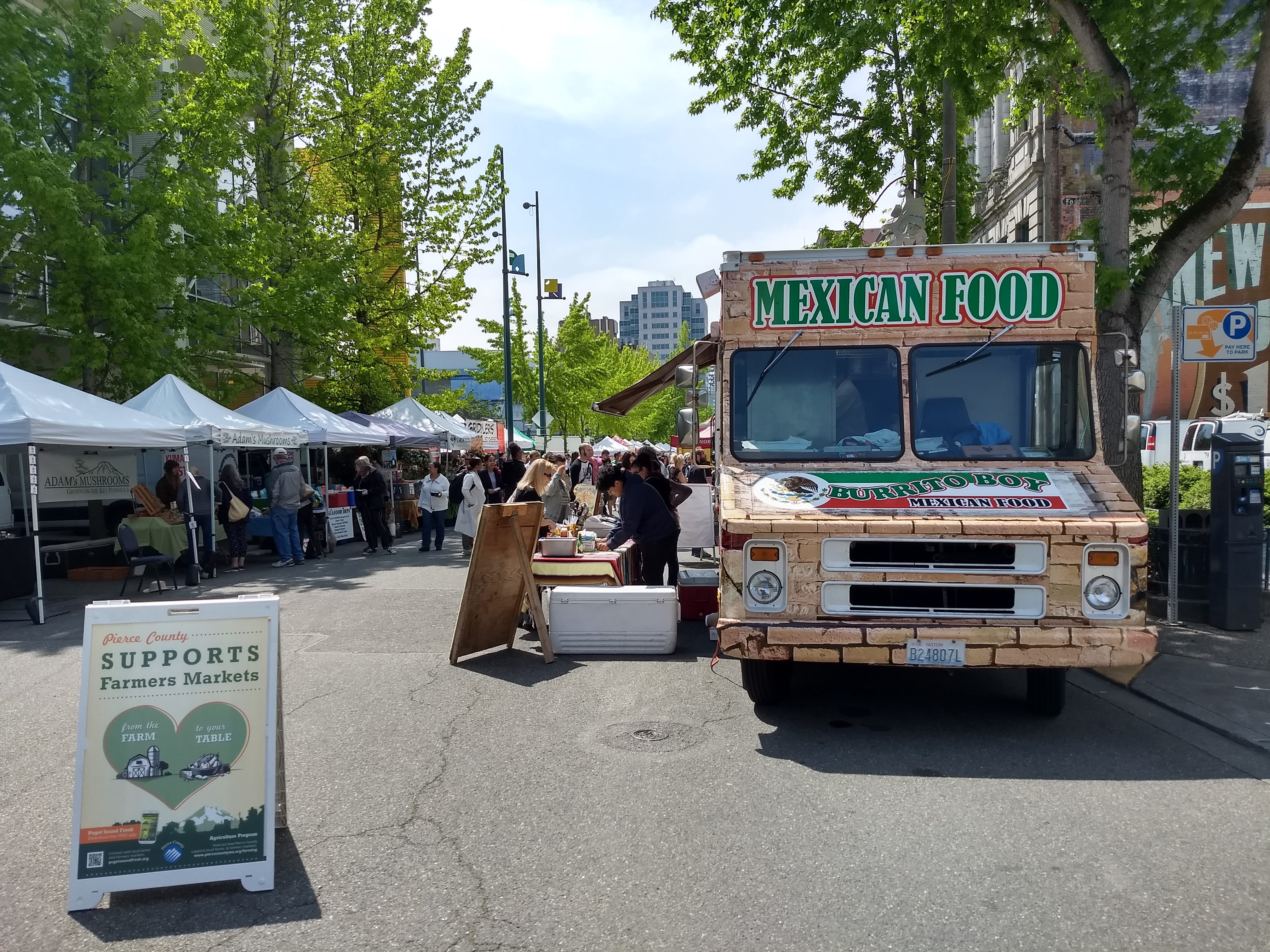
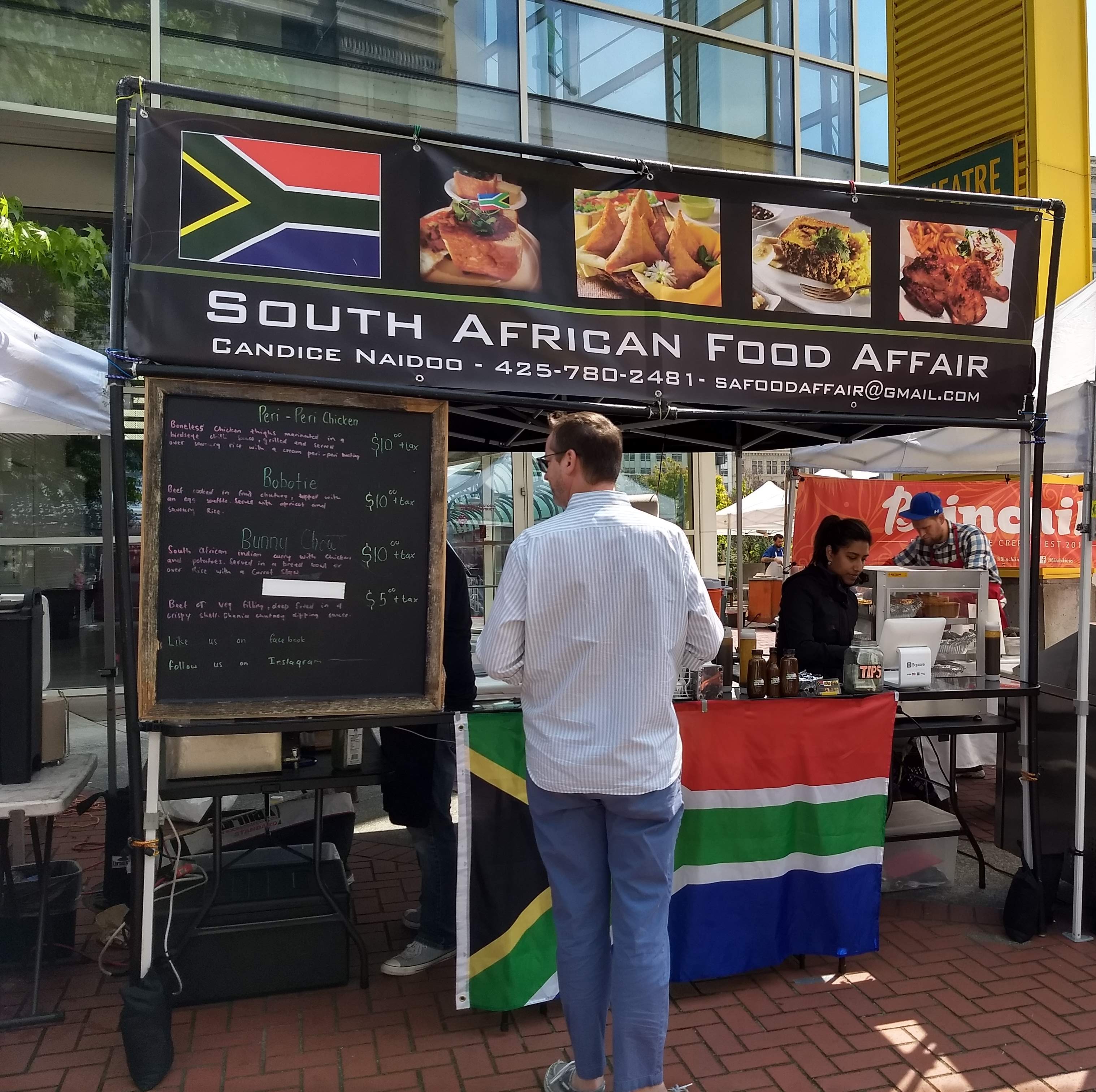
Cynthia learned about them last year when she was looking for food to cater for students of her Modern Africa course at the end of the quarter. She brought the leftovers home and Pierre instantly agreed it was pure awesomeness. This month’s #WinePW was a great excuse to go back for more! We had a fiery Peri Peri Chicken, and a Bobotie, a kind of meatloaf with raisins, chutney and spices, and topped with a soft egg custard. Delish!
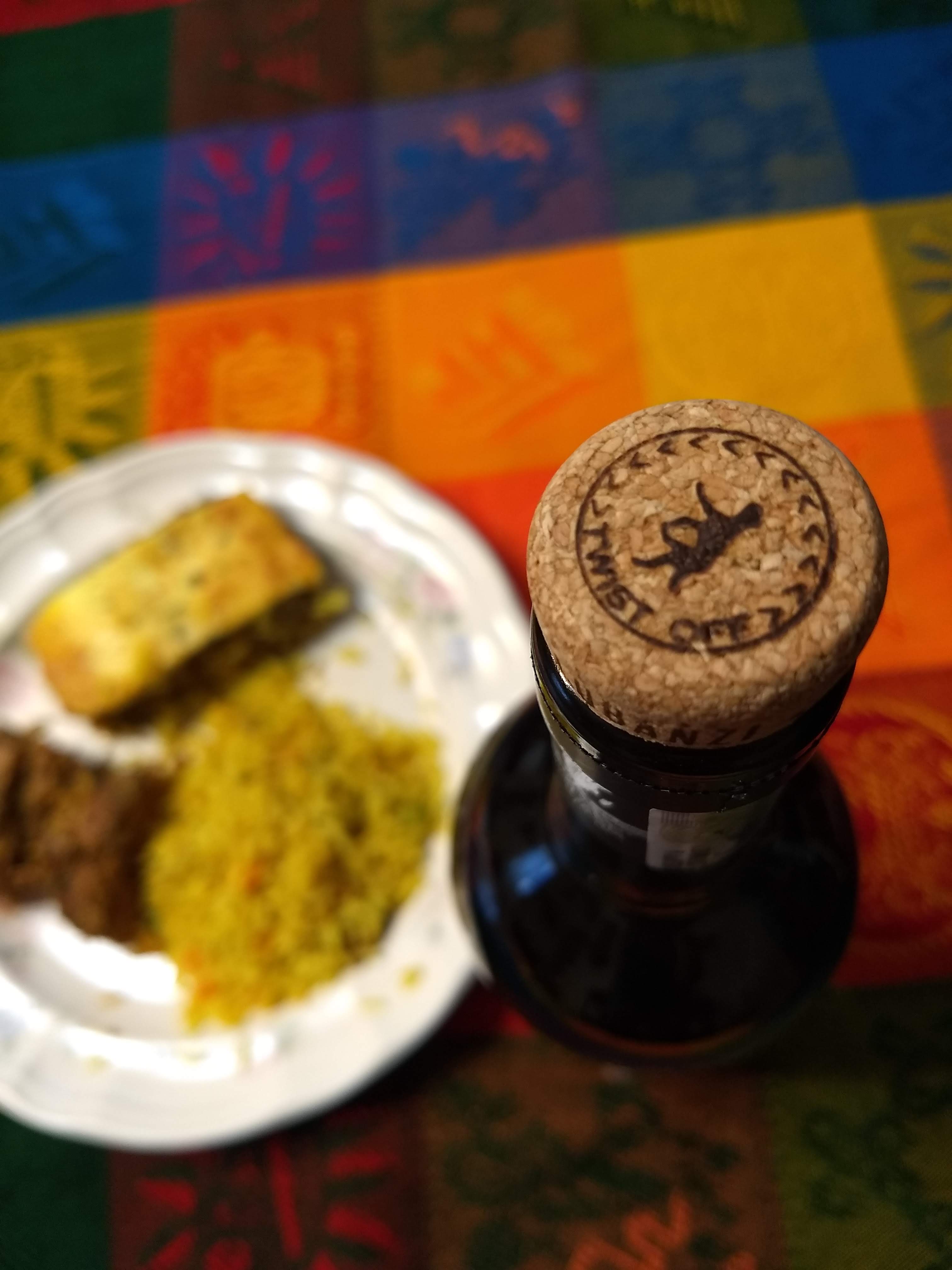
Oh, while we haven’t seen them around us, Lubanzi sells their wines in cans, too. Very convenient and lower carbon footprint in transport (and remember what Jamie Goode said recently on glass bottles making no sense for most wines).
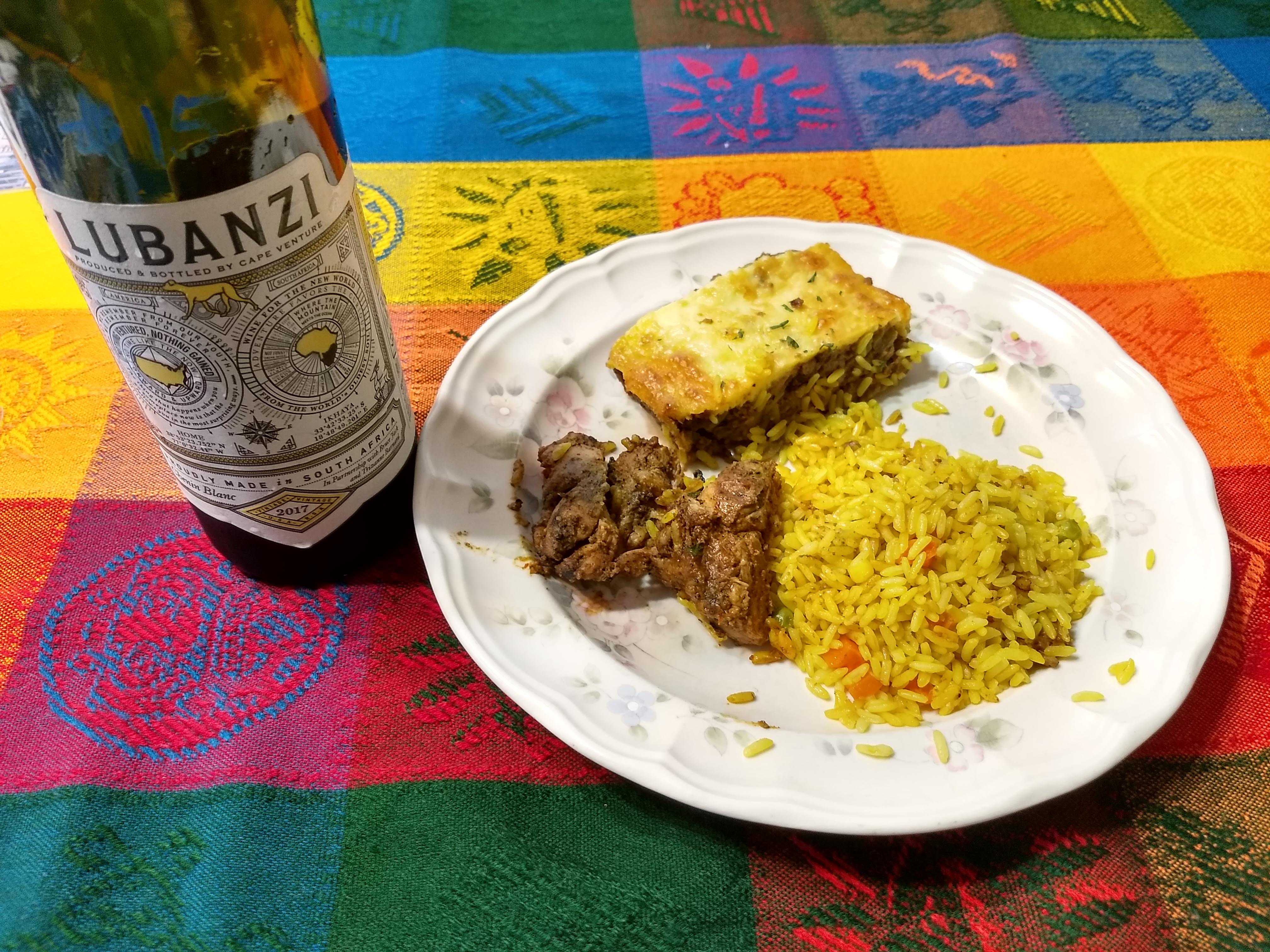
Next time (just guessing it will be next week), we’ll try the Bunny Chow. This only scratched a tiny bit of the surface of South African food of course. And watching the South Africa episode of Parts Unknown made us hungry for more discovery. Looks like we’ll have to go there!
Wine #2: Craven Pinot Noir 2017, Faure Vineyard, Stellenbosch
A week later, we dared a round two! Just because, as natural wine enthusiasts, we wanted to find South African examples. After reading an intriguing article by Jamie Goode and Treve Ring, we ordered the single vineyard Craven Pinot Noir online from the Wine Library (yes, Gary V’s family shop!). Here’s the winemaking approach as described on the importer’s website:
“In the cellar the de-stemmer is set aside opting to ferment this wine 100% whole bunch. Fruit is picked by hand and lightly foot stomped in open top fermenters to get some juice. From there it is lightly pumped over one-two times a day to quite simply move the juice around. The idea is not to over extract, wanting to keep as many whole bunches and berries intact. 2017 was on skins/stems for around 10 days, then drained and pressed to old barrels for 10 months.
The wine is bottled unfined and unfiltered, with nothing added during the winemaking process apart from a dash of Sulphur.”
Click here for more geeky details
We’re busy this week, so no time for an overly elaborate dinner nor a ton of drinking. Once again, Coravin was our friend. We prepared some pork shoulder we had in the fridge like for bún chả (see recipe here by lovely Helen Le) and with no time for the usual fun, we just served it with fish sauce dressing with rice and some spinach (which makes this NOT bún chả at all, LOL).
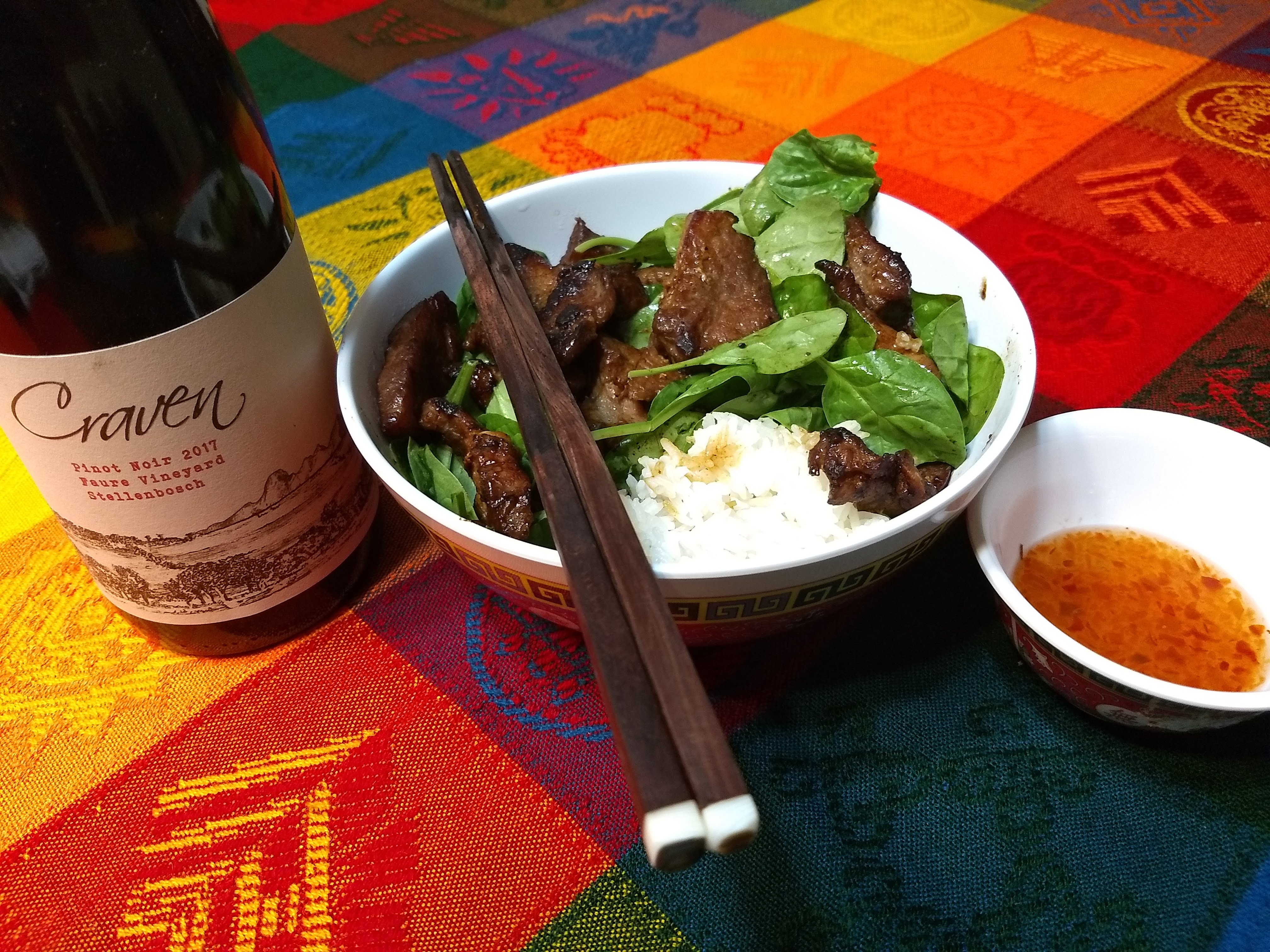
The Craven Pinot worked very well with this, showing nice cherry, earthy and savory notes, with refreshing acidity, and satisfying structure and crunch on the palate. A super fresh and lively wine that makes us want more (and there will be, thanks to Coravin).
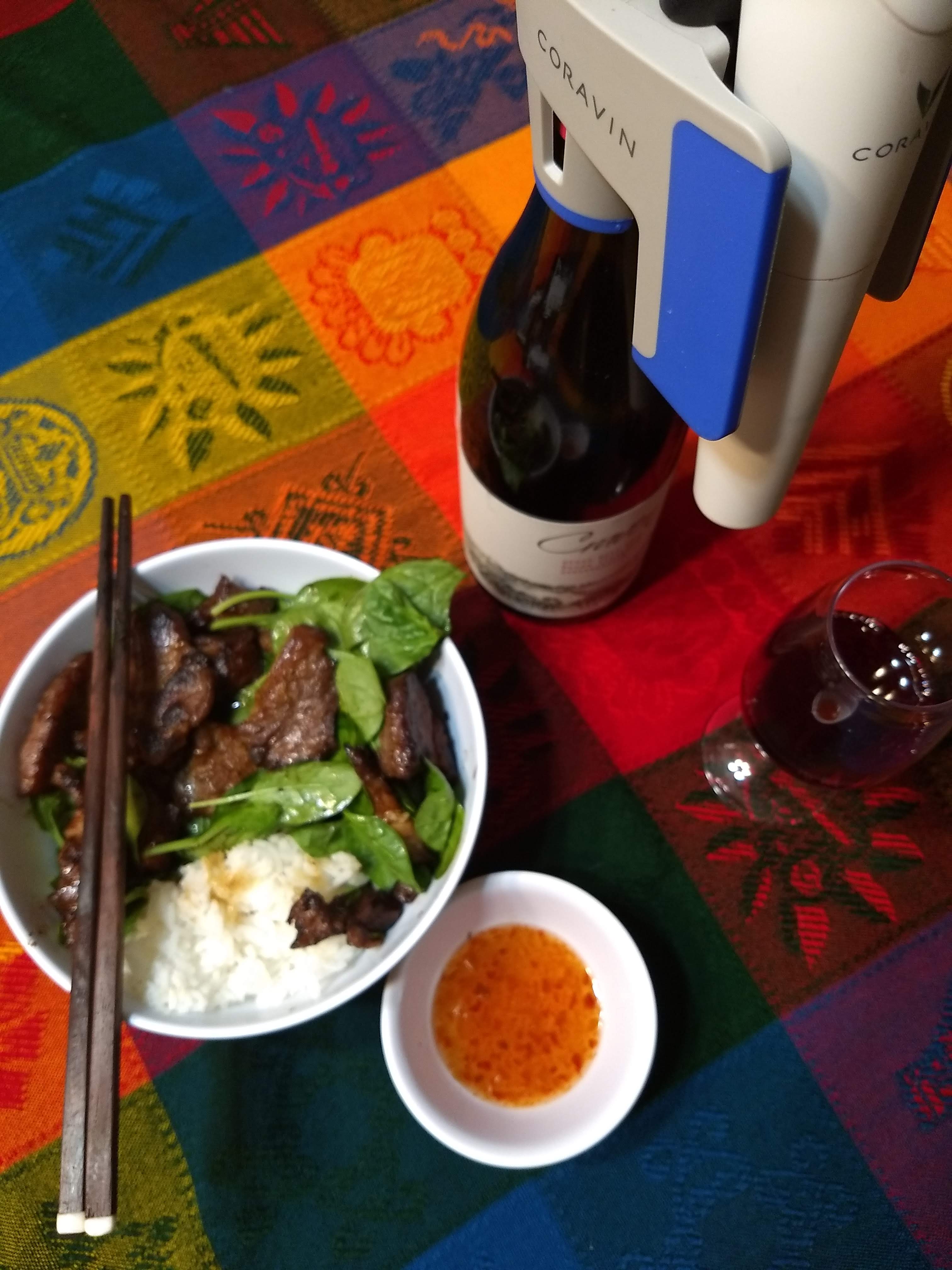
To pair with your South African wine exploration, here’s your homework (sorry, college professors here). First, explore the Social Sustainability page of Wines of South Africa (the industry’s promotion body). And then, watch this very interesting documentary that tackled several important issues. Among other things, the brief look at the relationship between a local black-owned winery and a Marks & Spencer’s buyer shows the kind of pressures many producers around the world face. Lots of food for thought.
Thanks to our #WinePW host of the month, Jennifer of Vino Travels Italy, for an exciting theme. Please check out all the contributions and food/wine adventures of the group below and join the discussion on Twitter (follow #WinePW) on Saturday June 8 at 8am PST.
- Camilla from the Culinary Adventures of Camilla shares “A South African Braai (Rhymes with ‘Fry’) + A Trio of Chenin Blancs”
- Wendy of A Day in the Life on the Farm features Grilled Chicken Caesar paired with a South African Chenin Blanc
- Lori of Dracaena Wines highlights “Unlocking the Marvels of Nature Through Wine”
- David of Cooking Chat shares “South African Chicken with Chakalaka and Chenin Blanc”
- Deanna of Asian Test Kitchen features “South African Chenin Blanc Paired with Vietnamese Food”
- Gwen of Wine Predator writes “3 Summer Wines from South Africa Shine for #CheninBlancDay #RoseDay #WinePW”
- Nicole of Somm’s Table shares “A South African Pinot Feast Hamilton Russell, Tesselaarsdal, and a Glazed Pork”
- Sarah of Curious Cuisinere features “South African Chutney Chicken and Chenin Blanc Pairing”
- Cynthia and Pierre of Traveling Wine Profs writes “A Celebration of Wine Industry Upgrading Paired with South African Food Truck Takeout”
- Pinny of Chinese Food and Wine Pairings shares “Spier Pinotage/Shiraz from South African Plus Sliced Lamb as Wrappers”
- Jeff of Food Wine Click features “Gemaak en Gebottle by Oorsprong: We’re Not in Kansas Anymore”
- Linda of My Full Wine Glass highlights “Golden Wine from a Golden Land – South Africa”
- Jill of L’Occasion writes “Making a Meal with Wine from South Africa”
- Cindy of Grape Experiences features ” A Family Affair: South African Chenin Blanc with Scallops, Tomatoes and Pesto”
- Jane of Always Ravenous writes “South African Chenin Blanc Paired with Shrimp, Scallops, and Mango Salsa”
- Michelle of Rockin Red Blog shares “Wandering into June with Lubanzi Wine and #WinePW”
- Our host, Jennifer at Vino Travels Italy features Zucchini Quiche with Raats Chenin Blanc from South Africa
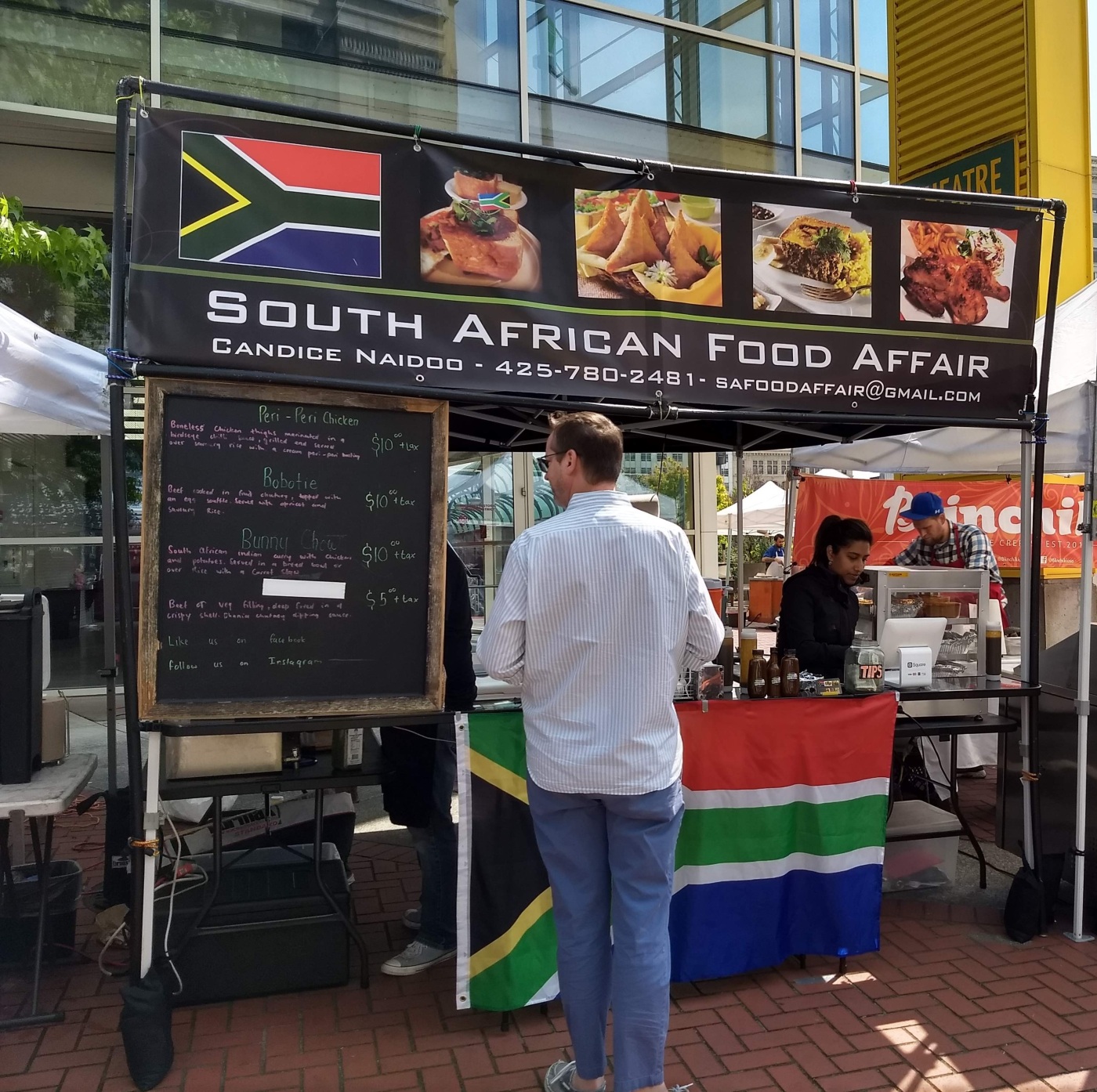
I feel much more educated than when I first started reading and I am very jealous of your proximity to a South African Food Truck.
LikeLiked by 1 person
Thanks for reading! That food truck is fantastic.
LikeLike
I watched a video posted on Spier’s site (my South African wine for #WinePW). The management of the wine farm is holding hands of the vineyard workers, forming a circle and delivering a “working together” message through their dance. This gives me a bit hope that regardless of the color of their skin and tasks they perform in the vineyard, they do work together to make some good wine to the best of their capability. Of course, getting more representation by races in certain industries is never easy in any country!
LikeLiked by 1 person
no matter how much you know, there is always more to learn! the beauty of wine!
LikeLiked by 1 person
Thanks for shining some light on the changes in the South Africa wine industry over the last 30 or so years. I was generally aware that much had changed in wine since the end of Apartheid, but only generally. I’ll look forward to watching the documentary from beginning to end.
LikeLiked by 1 person
Very informative post shedding some light on the South African wine industry. Nice to connect with you in this group!
LikeLiked by 1 person